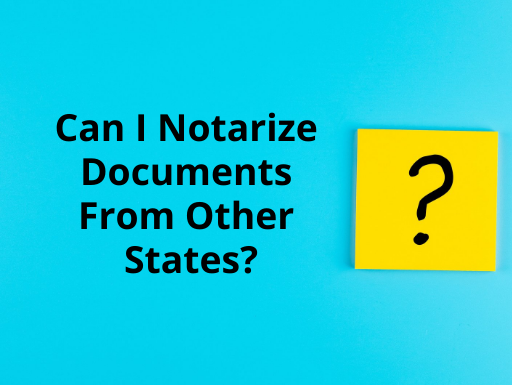This is one of the most common questions asked by newly commissioned Notaries Public! The uncertainty occurs when a Notary is presented with a document that clearly originated in another state, or appears to concern matters based primarily in another state.

This is one of the most common questions asked by newly commissioned Notaries Public! The uncertainty occurs when a Notary is presented with a document that clearly originated in another state, or appears to concern matters based primarily in another state.
Yes, a Notary can notarize such a document under one very important rule of thumb: the notarization must conform to all requirements of the Notary’s commissioning state.
Notaries, to know which notarial act is being requested and assess whether it can be performed compliantly, you must carefully review the document’s notarial certificate language to answer these key questions:
• Is the requested notarial act authorized in my state?
The full list of authorized notarial acts varies from state-to-state. For example, Notaries everywhere may perform the most common acts involving a signature on a document—acknowledgments and oaths/affirmations (also called jurats or verifications). Key phrases in the notarial certificates for these acts are “acknowledged before me…” and “sworn or affirmed before me,” or similar. But only Notaries in some states may perform a signature witnessing, indicated by wording such as “Signed before me…” with no mention of an acknowledgment or oath/affirmation.
Takeaway 1: Notary, be sure you know exactly which notarial acts your state authorizes.
• Does the notarial certificate language include additional statements that aren’t actual, authorized notarial acts?
Some document drafters reveal their limited Notary knowledge by fluffing-up notarial certificates with language that would cause the Notary to certify facts or actions that aren’t authorized notarial duties. A proper notarial certificate describes only the formalities of an authorized notarial act… the venue, the authorized notarial act performed, the named principal signer(s) and the fact of his/her/their personal appearance, the Notary’s signature (and seal, if required); the date of notarization; and any other information required by law of the Notary’s commissioning state.
Takeaway 2: Know your state’s notarial certificate wording for authorized notarial acts. Resources are your state laws and—in many states—a handbook or manual produced by your commissioning official and often provided online. (Notaries in Georgia, Florida, New Jersey and Texas: we offer the American Society of Notaries’ comprehensive Notary Handbook; visit the 'Notary Accessories' section of our online store.)
• Are the notarial certificate blanks prefilled with incorrect information?
For example, document drafters might prefill the Notary’s venue blanks with the state and county where the document originated or will be used, instead of leaving that space to be appropriately filled by the Notary with the location (state and county) where the notarial act was performed. Another blank that may be inappropriately prefilled is the date of notarization. In most states, a Notary may correct inaccurate information in a notarial certificate by lining through it, initialing the line and writing in the correct information (but watch out if exceptions apply… for example a Florida Notary cannot change anything in a document once it has been signed by anyone).
Takeaway 3: Never assume a document draft contains absolutely correct notarial certificate language. Once you sign and seal (if applicable) a notarial certificate, you are responsible for the truthfulness and accuracy of the information in it. Be sure that all the facts in your signed notarial certificate correctly reflect the facts of the notarial act you performed.
• Does the certificate language reflect all my state’s specified requirements (if any)?
Certificate language deficiencies are as important as outright errors. The drafter of a document originating in another state usually includes notarial certificate language for that state, whose language might not fully comply with certificate wording required in your state.
Takeaway: See Takeaway 2!
Finally, if you cannot use a document’s notarial certificate because it fails one or more of the assessments described above and, certificate amendments are so extensive that they will be an unclear mess, it’s possible to use a separate, blank notarial certificate form (unless like a Florida Notary you’re prohibiting from changing anything in an already-signed document).
When using a separate, blank notarial certificate form, select and complete the form that correlates to the requested authorized notarial act and attach the completed certificate form to the document in a way that deters removal (for example a staple, not a paperclip or binder clip). Draw a single diagonal line through the unusable notarial certificate on the document, and initial the line. Document your actions in the notarial record book (journal) entry that you create for this notarial act.
Takeaway: Two highly useful Notary products are blank notarial certificate forms and notarial record books (journals)… and Notary Public Underwriters, Inc. has them! Visit our online store to order these indispensable Notary products.
